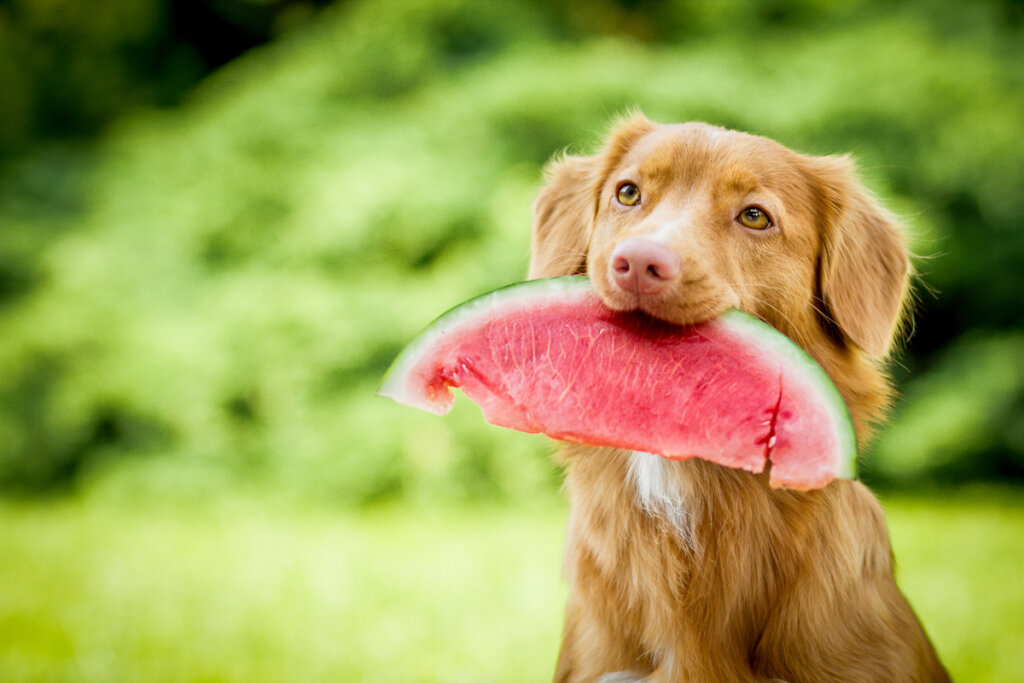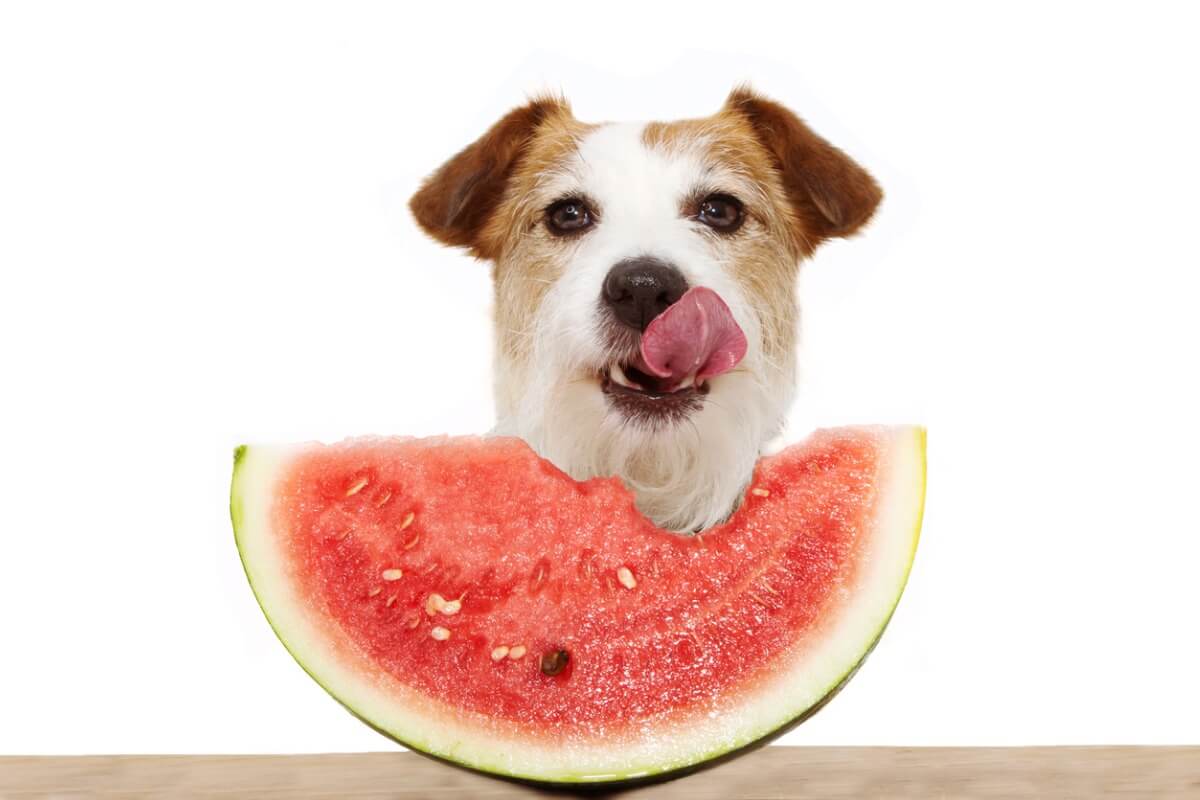Watermelon for Dogs: Is It Recommended?
Find out if you should give your dog watermelon in this article!

Watermelon is a very popular fruit all over the world. Its high water content (90%) makes it the ideal complement to cool off in difficult times, such as the middle of summer or during heat waves, which can affect humans and animals to different degrees. Watermelon is native to Africa, but has spread throughout the world. Its large size makes the watermelon ideal to share with the family, but what about watermelon for dogs?
Its versatility also opens the doors to the consumption of the fruit in different formats and surely at some point you may have wondered if watermelon is recommended for dogs. We’ll answer this question below.
Benefits of watermelon for dogs
Watermelon provides human beings with hundreds of beneficial health properties. The same happens with dogs, thanks to the vitamins, minerals and calories that this fruit provides. Here are some of the nutritional values in 100 grams of watermelon for dogs:
- Water: 91.45 grams (3.2 oz)
- Calories: 30 kilocalories
- Carbohydrates: 7.55 grams (0.25 oz)
- Vitamin C: 8.1 milligrams
- Calcium: 7.7 milligrams
- Protein: 0.61 grams
In addition to the elements already mentioned, watermelon contains high percentages of phosphorus, iron, potassium, vitamin E, and zinc. The vitamins and minerals that watermelon possesses fulfill various functions in a dog’s body:
- Vitamin C: helps to absorb iron correctly
- Vitamin A: strengthens the dog’s vision
- Calcium: necessary for bone health and strong limbs
- Iron: helps fight and reduce the risk of anemia in dogs, according to professional sources

Watermelon is a diuretic and digestive
In addition to its water content, watermelon is a fruit rich in vitamin C, essential for metabolism. In addition, it’s a natural diuretic, which helps to promote the flow of urine. Consequently, it protects the kidneys, the urinary system and helps to clean their intestines, according to studies.
It’s low in calories
Since the fruit is practically water, it’s low in calories, and ideal for dogs that are overweight. It can also be included in your diet to avoid the rebound effect. In addition, it can be used in dogs that have an ideal weight, as it helps to keep them fit, due to its low calorie content.
Contains citrulline
It should be taken into account that watermelon is rich in citrulline, an organic α-amino acid compound belonging to the group of non-protein amino acids, which is involved in the urea cycle. This has a fundamental role in the creation of proteins in the body and seems to act as a vasodilator, according to professional sources.
The aforementioned source and other organisms show that citrulline promotes muscle recovery, making it ideal for dogs that tend to exercise a lot during the day.
Counteracts heatstroke
Thanks to the fact that 90% of the fruit is water, watermelon is highly recommended during the hottest months, as it helps to keep dogs hydrated and cool. Heat stroke causes a series of negative reactions and consequences in the animal that suffers from it, due to the dehydration suffered and the loss of sugars. You should do everything in your power to prevent this from happening.
It’s rich in antioxidants
Various sources have recorded that watermelon is rich in antioxidants, compounds that minimize the impact of free radicals on the DNA of living beings. In this way, watermelon for dogs could improve their overall health and delay the development of degenerative diseases.
Is watermelon good for dogs?
Considering the benefits already mentioned, watermelon is undoubtedly a positive food for dogs. Its high water content ensures that your dog doesn’t become dehydrated and giving it this fruit is a different way to provide this fundamental nutritional element.
Watermelon doesn’t represent any risk of toxicity in your dog. On the contrary, it provides many essential benefits and nutrients in a fresh, sweet format. However, it’s advisable not to exceed the recommended amounts in watermelon for dogs.
Contraindications of watermelon for dogs
Sugar is a great risk for dogs that consume watermelon in large quantities. 100 grams ( 4 oz) of this fruit have 6.2 grams (0.22 oz) of sugar, so it should be given in small amounts to dogs with diabetes. Similarly, it isn’t recommended for dogs with hypotension or kidney failure, because it reduces pressure and contains potassium.
Recommended dosage
To avoid potential health problems in your dog, we recommend that you offer the watermelon without seeds and without peel. In this way, the dog won’t consume too much fiber and sugar. On the other hand, although it contains a lot of water, its recommended consumption shouldn’t be exceeded, and so you shouldn’t give your dog watermelon every day.
It’s also important to offer only a small amount the first time the dog eats watermelon, to make sure that your dog isn’t allergic to it. In the case of puppies, you can follow the aforementioned indications and pay more attention, because their digestive system isn’t fully mature.

As you can appreciate, watermelon for dogs is a very positive thing, as long as its recommended consumption isn’t exceeded. The minerals and vitamins it contains help to boost your pet’s health and make it easier for him to avoid certain diseases, and so you shouldn’t hesitate to include watermelon sporadically in its diet.

